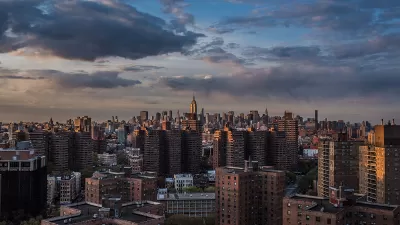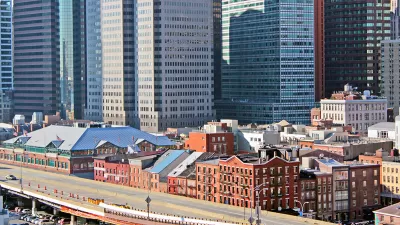New York City Mayor Bill de Blasio announced the details of the "Housing New York" plan this week. The plan will guide the de Blasio Administration toward its goal of creating 200,000 affordable housing units in the city.

"New York City will commit $8.2 billion in public funds to a 10-year housing plan that could transform the cityscape from Cypress Hills in Brooklyn to the shores of the Harlem River," according to an article by Mireya Navarro and Michael N. Grynbaum in the New York Times.
The $41.1 billion, ten-year plan will require "$2.9 billion in state and federal money and more than $30 billion the city expects to attract in private funds." That investment will earn the city 80,000 new affordable units while preserving 120,000 currently existing units.
Mayor de Blasio is quoted in the article describing the plan as, “a central pillar in the battle against inequality.”
Writing for The Architect's Newspaper, Henry Melcher adds details about the policy mechanisms included in the plan, as well their implications for the city's skyline. "As expected, one of the central pieces of de Blasio’s plan is 'mandatory inclusionary zoning,' which will require developers to include below market-rate units at rezoned sites."
Melcher shares more details from the report: "the City will also 're-examine parking requirements, zoning envelope constraints, and restrictions on the transferability of development rights.' It is also launching two programs to incentive development on vacant lots."
Melcher does the math and concludes, "De Blasio’s New York will likely be a denser New York," which, he adds, is likely to please the construction and architecture industries.
Stephen J. Miller, writing for Next City, also provides analysis of the plan, called the "Housing New York: A Five-Borough, Ten-Year Plan," which begins by comparing the new plan to Mayor de Blasio's campaign platform.
Miller finds that the growth of total housing in New York City under Mayor de Blasio's current housing proposals will equal the rate under Bloomberg—five percent over ten years.
Here, Miller details how Mayor de Blasio would spread funding among income groups: "Compared to the Bloomberg years, though, a much higher proportion of the new housing units created will be subsidized....De Blasio’s new-build affordable housing target is 60 percent higher than Bloomberg ended up with (and in two fewer years), even if it doesn’t quite measure up to what he promised on the campaign trail. And of those units, four times as many will be made available to the poorest class of working New Yorkers — which, for families of four, works out to those with incomes no greater than around $25,000 a year, with rents that don’t come near four digits."
FULL STORY: De Blasio Sets a 10-Year Plan for Housing, Putting the Focus on Affordability

Maui's Vacation Rental Debate Turns Ugly
Verbal attacks, misinformation campaigns and fistfights plague a high-stakes debate to convert thousands of vacation rentals into long-term housing.

Planetizen Federal Action Tracker
A weekly monitor of how Trump’s orders and actions are impacting planners and planning in America.

In Urban Planning, AI Prompting Could be the New Design Thinking
Creativity has long been key to great urban design. What if we see AI as our new creative partner?

King County Supportive Housing Program Offers Hope for Unhoused Residents
The county is taking a ‘Housing First’ approach that prioritizes getting people into housing, then offering wraparound supportive services.

Researchers Use AI to Get Clearer Picture of US Housing
Analysts are using artificial intelligence to supercharge their research by allowing them to comb through data faster. Though these AI tools can be error prone, they save time and housing researchers are optimistic about the future.

Making Shared Micromobility More Inclusive
Cities and shared mobility system operators can do more to include people with disabilities in planning and operations, per a new report.
Urban Design for Planners 1: Software Tools
This six-course series explores essential urban design concepts using open source software and equips planners with the tools they need to participate fully in the urban design process.
Planning for Universal Design
Learn the tools for implementing Universal Design in planning regulations.
planning NEXT
Appalachian Highlands Housing Partners
Mpact (founded as Rail~Volution)
City of Camden Redevelopment Agency
City of Astoria
City of Portland
City of Laramie




























